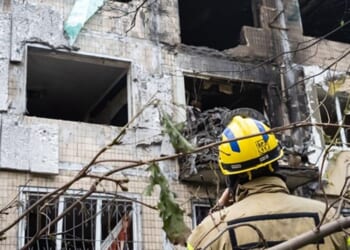I’m forgetting we ever had a government: Isn’t it wild how the government shutdown keeps going on and on and yet it’s barely driving the news?
To be fair, “government shutdown” was always a stupid misnomer: The many so-called “essential” services that remain up and running—and the fact that backpay is typically paid out to furloughed workers—make it so shutdowns don’t do so much to either save taxpayers money or to permanently slash the size of government. They do, however, simulate what life would be like without certain programs and departments, and one takeaway from this one is that lots of government functions can and should be put on the chopping block.
The Reason Roundup Newsletter by Liz Wolfe Liz and Reason help you make sense of the day’s news every morning.
Yesterday, yet another funding resolution failed in the Senate, the 11th of its kind. “Mike Johnson, the House speaker, has for weeks kept the House shuttered on an extended recess, and defended his strategy as necessary to push Senate Democrats into passing the House’s continuing resolution without policy additions,” reports The Guardian. “But Democrats have refused to support the measure without provisions addressing healthcare subsidies under the Affordable Care Act, which are set to expire at the end of the year.”
“The shutdown, which began on 1 October, has become the longest full government shutdown in US history,” adds The Guardian, “and the third-longest when including partial shutdowns. If it extends past Tuesday, it will surpass the 21-day shutdown of 1995-96 to claim second place. Only the 35-day partial shutdown during Donald Trump’s first term, from December 2018 to January 2019, has lasted longer.” (Full shutdowns are still not technically full, but are basically defined by the number of services and functions affected; during the full shutdowns of 2013 and 2018, a little shy of 1 million federal employees were furloughed.)
Of course, some government functions are valuable but not exactly urgent—like maintaining/modernizing the nuclear weapons arsenal. The roughly 1,400 people who work on this project were furloughed earlier this week. The effects of that decision won’t really be felt, but you could make the case that shutdowns hinder and slow down the sorts of long-term projects we need to prioritize. Other government functions—like immigration enforcement, described below—have remained beefed up throughout this shutdown. The administration has also found creative ways to soften the blow of the shutdown, including using research and development funds to make it so members of the military don’t miss a paycheck. Other services, like food stamps, might be affected if the shutdown extends for longer, with payments delayed or missed.
Perhaps the most striking thing about this shutdown, though, is how minor a news item it’s been so far. NPR seems upset, but few others have considered this headline news of late.
Trump, meanwhile, has taken the opportunity to do various small cuts: $8 billion in green energy projects in blue states; reductions in force—not furloughs!—have allegedly started, but the extent is not known (and the lawsuits that so frequently accompany them will take time to percolate through the courts).
Scenes from New York: Earlier this week, the right-wing influencer Savannah Hernandez posted a video taken at the corner of Broadway and Canal, where tons of counterfeit goods are sold:
WATCH: A huge group of African illegal immigrants are operating a black market on the corner of Broadway and Canal St in New York City.
The entire sidewalk is filled with illegals who state they are from Senegal and I watched as they fled police.
This corner looks exactly… pic.twitter.com/wdIJO1oVZV
— Savanah Hernandez (@sav_says_) October 19, 2025
She claims it’s men who came over from Senegal within the past few years, pretty much all of whom admit to being here illegally.
“There is NOTHING cool about bowing to criminal Africans while they block your RIGHT of way with their Chinese garbage, and—this should go without saying—there is NOTHING cool much less CHIC about buying a knockoff Goyard tote from them,” writes @junker_jo on X. “It’s destructive nihilism that if left unchecked will make the city (and therefore the world!) Hell on Earth!”
I’m not sure I’d go quite so far. Illegal immigrants selling goods that don’t really harm anyone don’t personally bother me that much. But yesterday afternoon, more than two dozen federal law enforcement agents visited Canal and busted the scene. “During this law enforcement operation, rioters who were shouting obscenities, became violent and obstructed law enforcement duties, including blocking vehicles and assaulting law enforcement,” a Department of Homeland Security spokesman claimed. “Already one rioter has been arrested for assault on a federal officer.”
“The enforcement action comes just days after federal agents arrested two men outside the Row Hotel in Midtown, a city-run migrant shelter,” reports Gothamist. “Officials said the men were allegedly tied to a Venezuelan gang, part of what McLaughlin described as a broader effort to ‘restore law and order’ in New York City.”
This seems like a much more worthy target. But there’s also a broader question of whether New York ought to be a place of lawlessness or not. Street vendors operating without permits don’t worry me much, but there is an inherent unfairness to the many people who choose to operate their businesses legally. And the goods sold by these guys on Canal Street were probably gotten via unsavory means, so there’s the question of whether authorities want to encourage those supply lines or attempt to eradicate them.
QUICK HITS
- “On Sept. 2, Everytown for Gun Safety, an organization funded by billionaire Michael Bloomberg, announced a new firearms training initiative called Train SMART. Everytown’s website describes a program ‘created by veterans who bring the military’s proven principles of firearms training, safety, and responsibility to the civilian market,'” writes Slate. “It promises accessible, affordable preparation for new and current gun owners who want to protect their families or to hunt and shoot recreationally.” Naturally, the group’s supporters are pissed, because this concedes that guns are a reality, something secured by our rights here in America, and a means of defense that’s not disappearing anytime soon.
- A whole podcast episode on the Baumol effect! This is all women (okay, maybe just me) secretly want.
- Once you see it, you can’t unsee:
Their ardent fans won’t admit it but Zohran Mamdani and Pete Buttigieg have very similar vibes
— Zaid Jilani (@ZaidJilani) October 22, 2025
They are both type As inspired by their somewhat Marxist fathers to be strivers in politics and punched way above their weight
— Zaid Jilani (@ZaidJilani) October 22, 2025
- Interesting piece from The New York Times on Wyoming’s quest to funnel more students to both college and technical programs.
- Turns out, extreme peanut avoidance for babies and children was a bad idea: “A landmark trial in 2015 found that feeding peanuts to babies could cut their chances of developing an allergy by over 80 percent. In 2017, the National Institute of Allergy and Infectious Diseases formally recommended the early-introduction approach and issued national guidelines,” per The New York Times. “The new study, published Monday in the journal Pediatrics, found that food allergy rates in children under 3 fell after those guidelines were put into place—dropping to 0.93 percent between 2017 and 2020, from 1.46 percent between 2012 and 2015. That’s a 36 percent reduction in all food allergies, driven largely by a 43 percent drop in peanut allergies.”
- Reason‘s very own Zach Weissmueller is in town debating whether Oregon’s drug decriminalization is proof drug decrim will fail elsewhere. Here’s a documentary he produced on the matter, and here’s a picture from last night:
Two huge accomplishments: My work buddy @TheAbridgedZach performed wonderfully in last night’s Soho Forum debate on drug decriminalization in Oregon AND I managed to wear heels despite being in my third trimester. Hard to say which is more impressive tbh pic.twitter.com/C63bAJUF14
— Liz Wolfe (@LizWolfeReason) October 22, 2025















